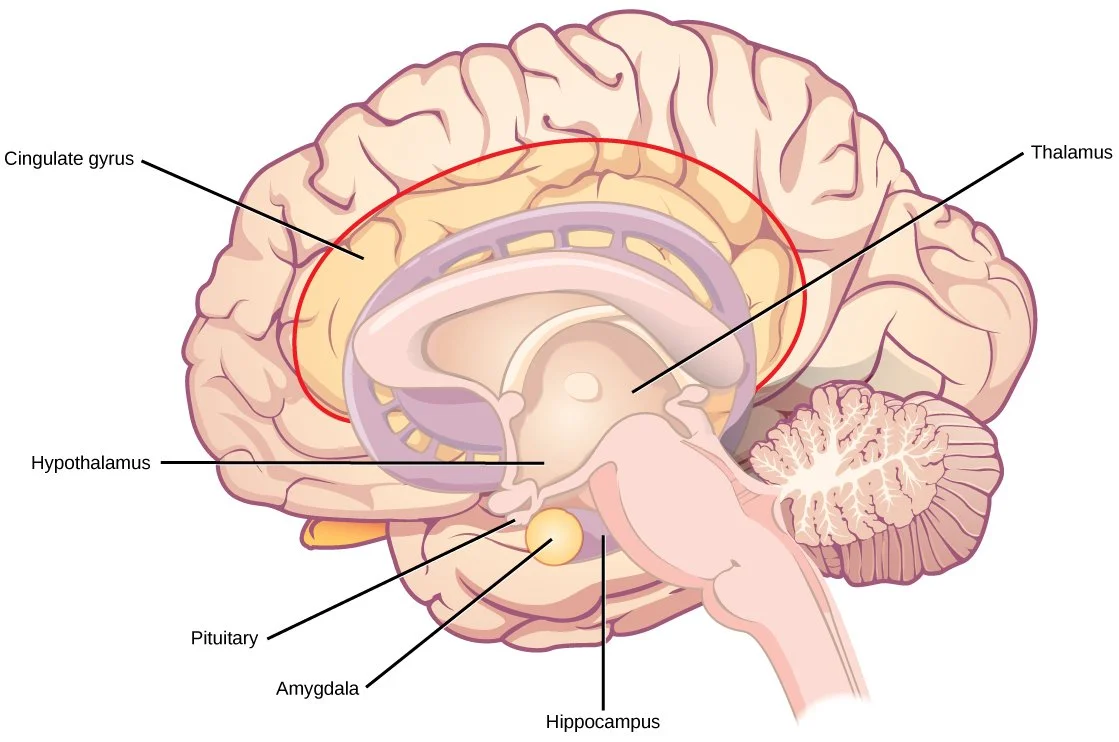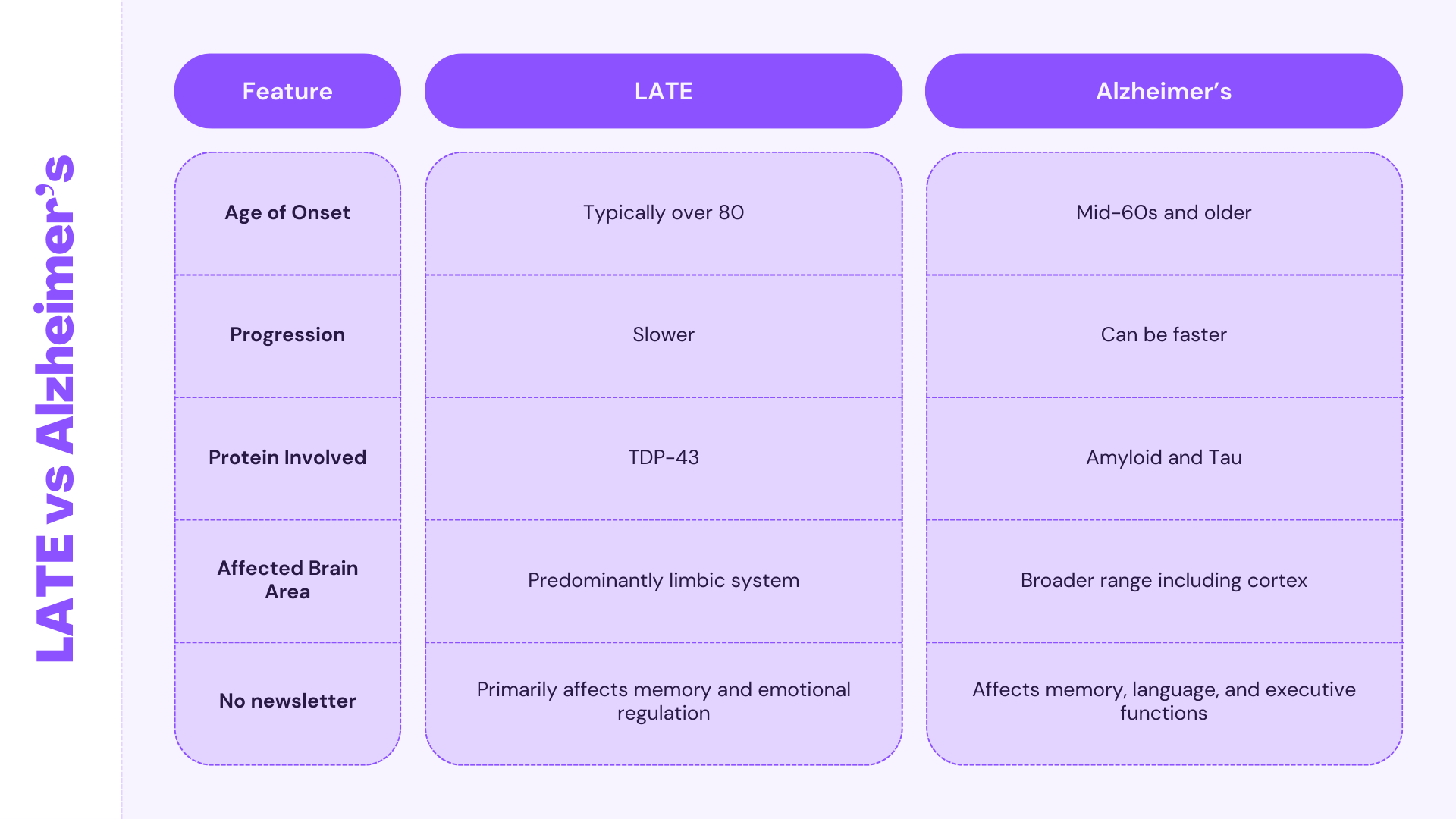Introduction
Did you know that not all dementia cases in the elderly are due to Alzheimer's disease? Recent research has uncovered another culprit called LATE, which affects those over 80. Understanding LATE is crucial for distinguishing it from Alzheimer's and for ensuring appropriate care for those affected. This blog post aims to educate you about LATE, its symptoms, and how it differs from Alzheimer's disease.
What is LATE?
LATE is a form of dementia that primarily affects older adults, typically those over the age of 80. It is caused by the accumulation of a protein called TDP-43 in the brain. Unlike Alzheimer's, which is characterized by the buildup of amyloid plaques and tau tangles, LATE is defined by the presence of TDP-43 proteinopathies. These protein deposits predominantly affect the limbic system, a part of the brain crucial for memory and emotional regulation. Understanding the difference between LATE and Alzheimer's can significantly impact the approach to treatment and care, ensuring that individuals receive the most effective interventions (Frontiers) (Frontiers).
The structures of the limbic system.
Symptoms of LATE
The symptoms of LATE can closely resemble those of Alzheimer's disease, making it challenging to diagnose. Common symptoms include:
Memory Loss: Similar to Alzheimer's, individuals with LATE experience significant memory loss.
Cognitive Decline: This includes difficulties with thinking, reasoning, and understanding.
Behavioral Changes: Changes in mood and behavior, such as increased irritability or depression, are common.
Language Difficulties: Some individuals may have trouble finding the right words or understanding language.
For instance, a patient with LATE might recall recent events well but struggle with remembering names or appointments, whereas Alzheimer's patients often have broader memory lapses.
Distinguishing LATE from Alzheimer's
While the symptoms of LATE and Alzheimer's are similar, there are key differences:
The Role of Neuropsychology in Diagnosis
Neuropsychology plays a crucial role in the diagnosis and management of LATE. Neuropsychologists are experts in understanding the relationship between brain function and behavior, making them uniquely qualified to differentiate between various forms of dementia, including LATE and Alzheimer's. Here’s how they contribute:
Comprehensive Cognitive Assessments: Neuropsychologists conduct detailed cognitive assessments to evaluate memory, language, executive function, and other cognitive abilities. These assessments help identify specific patterns of cognitive decline that may indicate LATE rather than Alzheimer's (Frontiers).
Use of Neuroimaging and Biomarkers: Neuropsychologists often work with neurologists to incorporate neuroimaging techniques, such as MRI and PET scans, which can reveal the presence and distribution of TDP-43 protein deposits. This imaging is crucial for distinguishing LATE from other types of dementia (Frontiers).
Developing Personalized Care Plans: Based on the cognitive and imaging assessments, neuropsychologists help develop personalized care plans that address the specific needs of individuals with LATE. This can include recommendations for cognitive therapies, lifestyle modifications, and support strategies for caregivers (Frontiers) (Frontiers).
Research and Education: Neuropsychologists are at the forefront of research into LATE, contributing to our understanding of its progression and potential interventions. They also play a key role in educating patients, families, and healthcare providers about LATE and its management (Frontiers).
Diagnosis of LATE
Diagnosing LATE can be challenging due to its similarities with Alzheimer's. Currently, diagnosis often involves a combination of clinical assessments, imaging techniques, and post-mortem brain examinations. Researchers are working on developing more precise diagnostic tools, including biomarkers that can be detected in living patients (Frontiers).
Treatment and Management
Currently, there is no cure for LATE. Treatment focuses on managing symptoms and improving the quality of life for patients. This includes:
Medications: While there are no specific medications for LATE, drugs used to treat symptoms of Alzheimer's, such as cholinesterase inhibitors and memantine, can sometimes help manage symptoms of cognitive decline and memory loss in LATE patients (Frontiers).
Therapies:
Cognitive Therapy: Engaging in cognitive training exercises can help maintain cognitive functions and slow the progression of cognitive decline. Techniques include memory exercises, problem-solving tasks, and activities that promote mental engagement (Frontiers).
Behavioral Interventions: Behavioral therapy can address mood and behavioral changes. This might include strategies to reduce agitation, improve mood, and enhance the patient's overall well-being (Frontiers) (Frontiers).
Occupational Therapy: Occupational therapy helps individuals maintain their independence by teaching strategies to manage daily activities and improve quality of life (Frontiers).
Lifestyle Modifications: Encouraging a healthy lifestyle can help manage LATE symptoms. This includes a balanced diet, regular physical exercise, mental stimulation, and social engagement. These factors can contribute to overall brain health and slow the progression of cognitive decline (Frontiers).
Support for Caregivers: Providing education and resources for caregivers is crucial, as they play a significant role in the care of individuals with LATE. Support groups, counseling, and respite care can help caregivers manage stress and maintain their own well-being (Frontiers) (Frontiers).
Coexistence with Alzheimer’s
It's important to note that LATE and Alzheimer's can exist independently or comorbidly. This means that an individual can have LATE, Alzheimer's, or both simultaneously. If you or a loved one is experiencing symptoms of cognitive decline, it is essential to seek a comprehensive evaluation from a healthcare professional. A thorough assessment can help determine the underlying causes and guide appropriate treatment.
If you are concerned about yourself or a loved one, please contact us to schedule an appointment. Our team of specialists is here to provide a thorough evaluation and personalized care plan to address your needs.
Conclusion
LATE is a newly identified form of dementia that shares many symptoms with Alzheimer's disease but has distinct differences, particularly in its underlying causes and progression. By increasing awareness and understanding of LATE, we can improve the care and support for those affected by this condition. If you suspect a loved one may be experiencing symptoms of dementia, it is important to consult with a healthcare provider for an accurate diagnosis and appropriate management.
For more detailed information, check out resources from the National Institute on Aging and Alzheimer's Association.
References
National Institute on Aging: LATE: A newly identified type of brain disorder
Alzheimer's Association: LATE
Frontiers in Psychology: Current Trends in Neuropsychology


